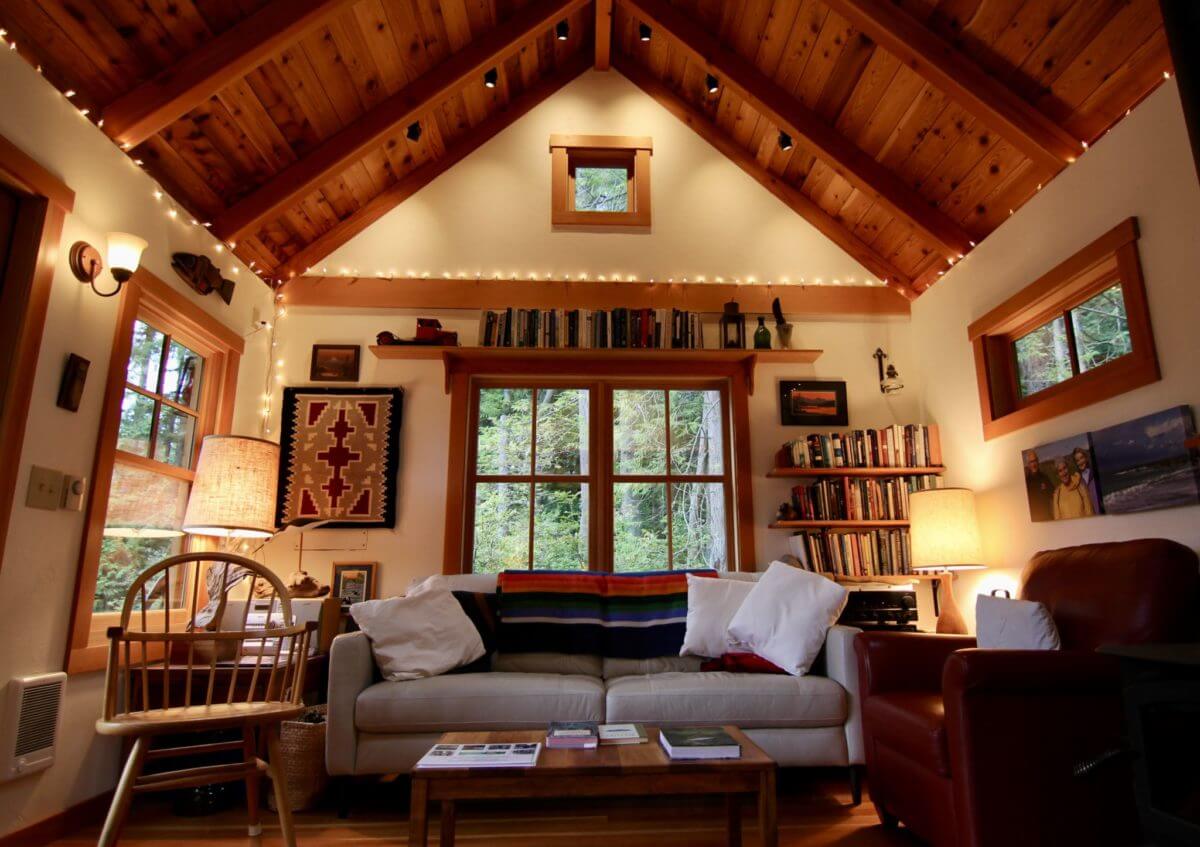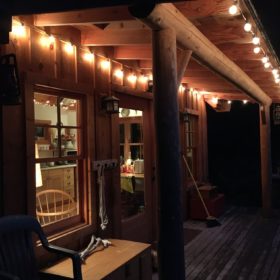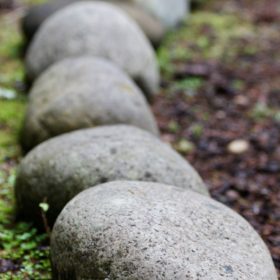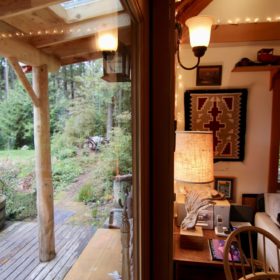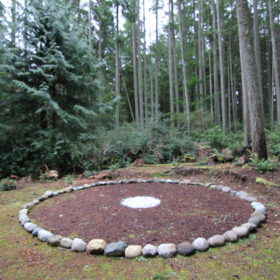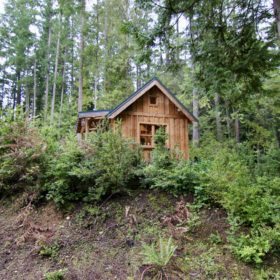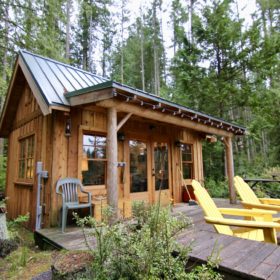by Marnie Jackson
I welcomed the new year with a day of rest, reflection, and solitude in Hilltop Cabin. The cabin, owned and offered by Whidbey Institute founders Fritz and Vivienne Hull, is nestled in the center of our 106 acre conservation forest near Storyhouse Meadow. I arrived in the cozy, bright space and had a quick orientation from Fritz, who showed me the amenities—heaters and a wood stove, a little kitchen for making tea and warming up my lunch, and a fantastic library of works from poets, philosophers, naturalists, and eco-theologians. When I asked him if he had any particular advice for me to make the best use of my day, he encouraged me to spend time among the trees.
My day began simply enough, and I spent my first hour riffing through the notebooks that Fritz and Vivienne have compiled on subjects like Celtic Spirituality, the Life Wheel, and the life and work of Thomas Berry. In that reading, I was struck by a profound sense of continuity. The Chinook Learning Community, founded by Fritz and Vivienne in 1972, didn’t just give way to the Whidbey Institute—it became it. Thomas Berry Hall was not named by accident, but as an entreaty to remember and carry forward the work of this man who wrote, “the natural world is the larger sacred community to which we belong. To be alienated from this community is to become destitute in all that makes us human. To damage this community is to diminish our own existence.” The Hilltop Cabin itself has a clear purpose and its construction and siting was sincerely intentional: it is a place for immersion in nature, for reflection on Self and Earth, and for rediscovering how to be human in these times.
The Hilltop Cabin has a clear purpose and its construction and siting was sincerely intentional: it is a place for immersion in nature, for reflection on Self and Earth, and for rediscovering how to be human in these times.
I had come prepared, with colored ink pens, a blank journal, washi tape, and dozens of year-end journaling prompts. Fritz and Vivienne had provided even more resources, including a wicker basket of art supplies and reams of blank paper. I was ready to sit and reflect, making a fresh start for a new decade with clarity of purpose and power of intention. Then, a funny thing happened. After sitting and doodling for half an hour, I felt complete with my journaling.
As a professional writer, I spend most of every day putting words to paper. As a mother and partner, I had spent the week between Solstice and Christmas drawing, painting, and creating vision board collages with my family. I was all journaled out, and therein lay another gift of Hilltop Cabin—the freedom to discover what I needed most. I didn’t need a colorful calendar, a cheerful goal list, or a revised personal purpose statement. I needed to be quiet—in body, mind, and heart. I needed to be alone in the woods.
I took my camera and my coat and made my way down the forest path to a stone circle, ringed with trees and lying just a few dozen yards from the Hilltop Cabin. A weed-suppressing barrier had been laid down, and white stones had been placed atop it. I noticed the persistence of new plant life, pushing up between the stones and reaching little green needles toward the light.
Plants are agents in their own lives. I once read that the compounds released by plants into the atmosphere actually change the quality of the light those plants receive, increasing photosynthesis by diffusing light in the forest. A Guardian author summarizing these findings wrote, “plants have evolved a clever trick to redirect sunlight and bring the weather they want down into the forest understory.” These trees are not inanimate features of my habitat, but co-creators of ours.
Therein lay another gift of Hilltop Cabin—the freedom to discover what I needed most.
I sat on the Earth in the center of the circle, contemplating the coolness under my seat and the vastness of the forest canopy. I listened for birds, close in and far off, and for the tiptoe of who-knows-who—Doe? Squirrel?—through the underbrush.
After some time, I stood and continued my walk, eventually finding myself back at the cabin. It was now midday, and I warmed up tea and soup before settling on the couch with a novel I’d been longing to reread for years. I made it through 75% of the book, then dozed off for my first nap in at least a decade. I woke up refreshed, to the sound of a woodpecker knocking nearby.
By the end of my 9 hour stay in the Hilltop Cabin, I felt like a human BEing—just being. No doing, planning, producing, delivering, or performing. It was not what I’d set out to achieve during this one precious day alone, and yet it felt like the most important possible work.
After a day of solitude in nature, it felt right that I got on my bicycle to return home. I couldn’t imagine climbing into a car, closing the door to the forest, and turning on a gasoline engine at the close of such a day. If my day alone taught me anything, it is that the patterns of human activity that are at odds with nature are at odds with our own being, and that what is healthy for my planet is indistinguishable from what is healthy for me.
Hilltop Retreats are offered to the public. Visit the website to learn more and book your day-long retreat.

